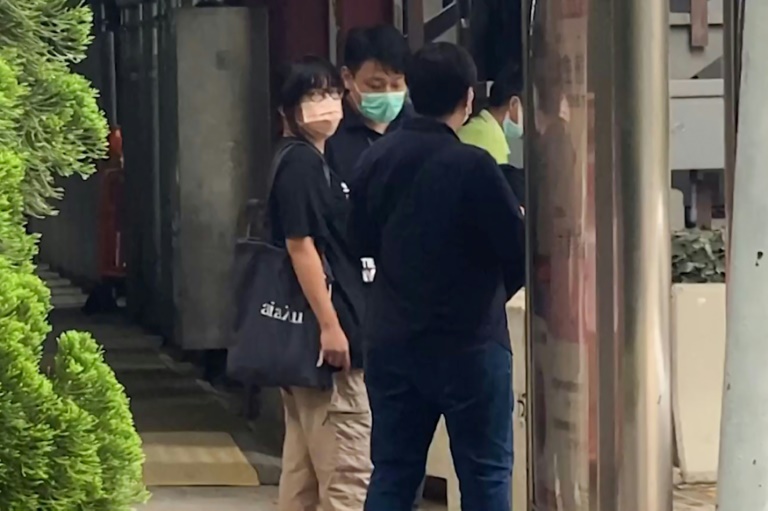Hong Kong police detained a democracy leader on Friday morning as authorities sought to prevent any public commemoration of the anniversary of Beijing’s deadly Tiananmen crackdown.
Thousands of officers were on standby after the government banned an annual candlelight vigil that has served for decades as a day of pro-democracy people power in the city.
The first arrest came early Friday morning when Chow Hang-tung, one of the few remaining prominent democracy activists not already in jail was detained by four officers outside her office.
Chow, 37, is one of the vice-chair of the Hong Kong Alliance which organises the annual vigil.
A police source told AFP she had been detained on suspicion of publicising an unlawful assembly.
Huge crowds have traditionally gathered in Hong Kong to mark the anniversary of Chinese troops crushing peaceful democracy protests in Beijing’s Tiananmen Square on June 4, 1989.
Hundreds of people were killed in the crackdown, by some estimates more than 1,000.
Public commemorations of the event are forbidden on the mainland.
Under the one-China, two systems policy that was meant to give Hong Kong more freedoms, the city was the only place on Chinese soil where large-scale commemorations were tolerated.
The biggest events in Hong Kong were at Victoria Park, where candlelit vigils were held to remember those killed and to call on China to embrace democracy.
Authorities banned this year’s gathering citing the coronavirus pandemic — although Hong Kong has not recorded an untraceable local transmission in more than a month.
While last year’s vigil was also denied permission because of the pandemic, thousands simply defied the ban.
But much has changed in Hong Kong over the last year as authorities seek to snuff out the city’s pro-democracy movement using a powerful new national security law to criminalise much dissent.
Officials have warned the subversion clause of that law could be used against those marking Tiananmen.
Most of the city’s most prominent democracy figures — many of whom would organise and attend the annual Tiananmen vigils — are in jail, have been arrested or have fled overseas.
– Remember in private –
The threat of mass arrests has forced those who would normally attend the vigil to think creatively.
Activists have called on residents to light candles in their own homes or neighbourhoods come Friday evening, or post commemoration messages on social media.
One campaign has called for Hong Kongers to write the numbers 6 and 4 — representing June 4 — on light switches at home.
“A regime can ban an assembly but it can never ban the indelible grievances in people’s hearts,” Lee Cheuk-yan, a now jailed democracy activist, wrote in a message published on his Facebook page on Thursday.
“I hope everyone can find your own way to light a candle by the window, on the road, wherever that can be seen by others, to continue our mourning,” he added.
Clara Cheung was among a small group of artists who gathered near Victoria Park on Thursday evening.
She brought 64 white flowers and laid them on the street.
“We need to find a new way to express ourselves,” she told AFP.
Much like the initial generation of Tiananmen survivors who fled abroad three decades ago, many Hong Kong democracy figures have chosen self-exile and plan to lead their own commemorations overseas.
Vigils are planned in cities like Tokyo, Sydney, Taipei, London, Berlin and Washington.
In mainland China, the Tiananmen anniversary is usually marked with a dramatic increase in online censorship and the square in Beijing being cordoned off.
– Security law –
Beijing imposed the national security law on Hong Kong just a few weeks after last year’s rally in response to 2019’s huge and often violent pro-democracy protests.
It has transformed the city’s once freewheeling political landscape.
More than 100 pro-democracy figures have been arrested under the new law, mostly for political views and speech.
Most are denied bail and face up to life in prison if convicted.
Pro-Beijing politicians have suggested that calls to “End one party rule” and “Bring democracy to China” — both common chants at Tiananmen vigils — could now be deemed subversion, one of the national security crimes in the broadly worded law.
The security legislation has been combined with a new campaign dubbed “Patriots rule Hong Kong” aimed at purging anyone perceived to be disloyal from public office.
China says the measures have restored stability.
Critics, including many western governments, say the crackdown has shredded Beijing’s promise that Hong Kong could maintain key freedoms after its 1997 handover from Britain to China.










